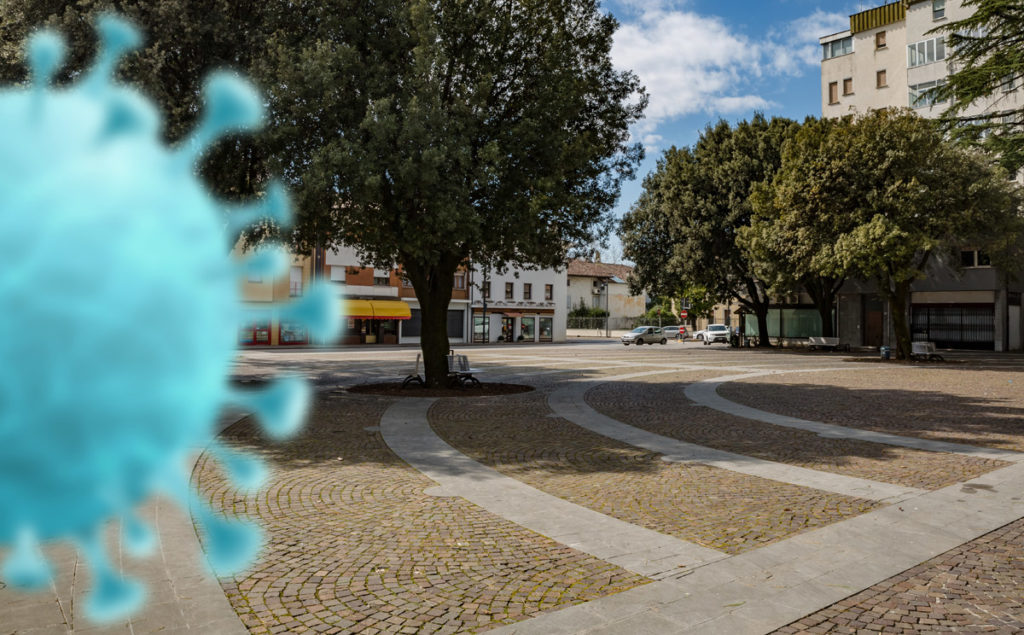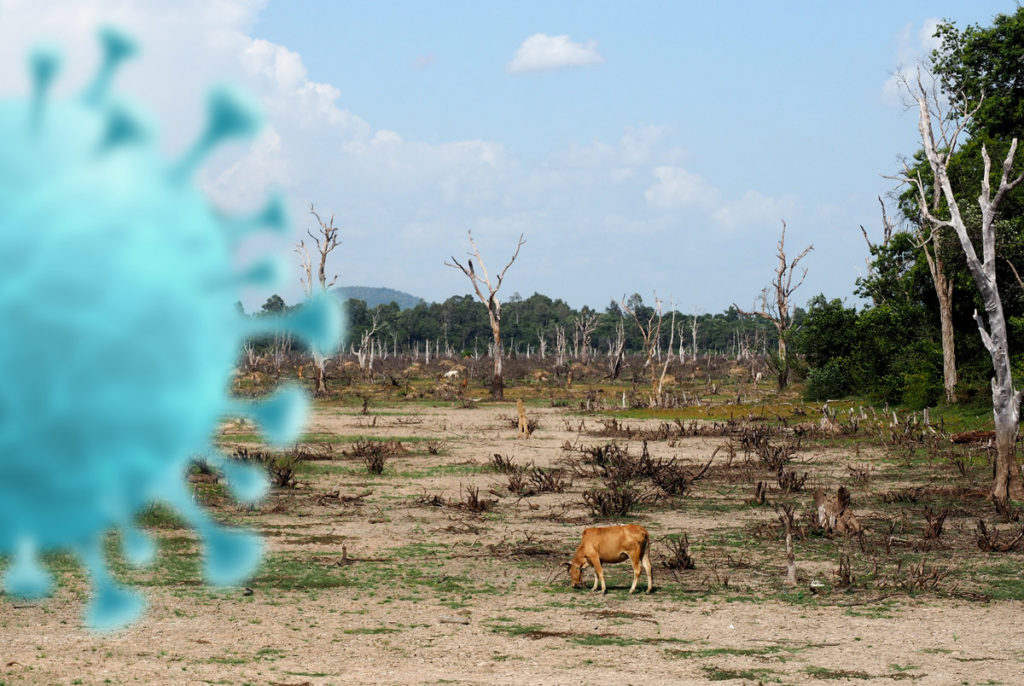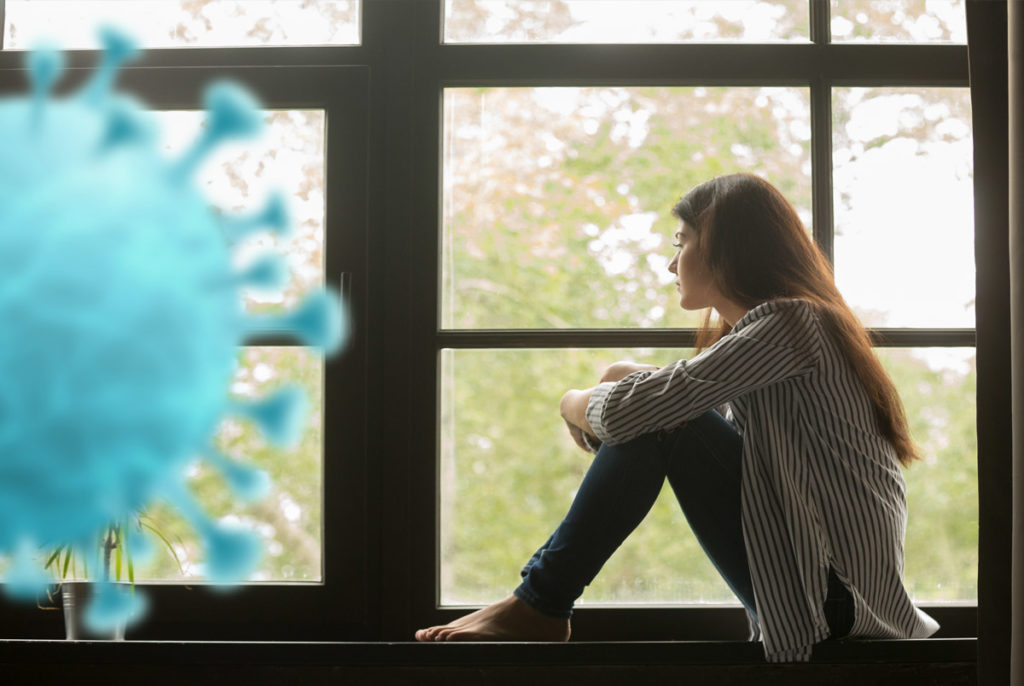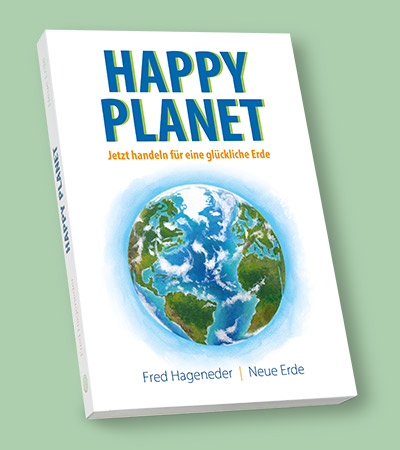Corona – Distractions
LA CORONA DELLA CREAZIONE – THE CROWN OF CREATION

Part 4: Corona – What's on the agenda?
3 April 2020
The reasons for the international Covid-19 pandemic are quite clear: landscape degradation, animal trade, globalism, and poorly equipped health systems. But still many questions, guesses and rumours linger and, rightfully so, keep people engaged.
Fear and panic are among the worst forms of stress, and stress is the worst for the immune system. So why do mainstream media and official bodies create so much fear when it comes to a pandemic?
The situation
Current mechanisms of fearmongering in mainstream media:
1) Comparative figures are hardly ever given.
The International Journal of Antimicrobial Agents states that the corona virus currently circulating is not significantly different from those previously circulating worldwide. And it points out that 2.6 million people die each year during normal flu outbreaks.(1) Corona-infected people so far: 1,044,000, deaths 57,000 (April 3, 2020).(2) See also the info graph video, Part 3 of this article.
However, epidemiologists are very worried because nobody knows how much more this new virus will spread.(2)
2) Positively tested people are wrongly equated with “infected” people, and “infected” people with “sick” people.
Since the beginning of the Covid-19 outbreak all media recite “case” numbers of infected people. They shocked with lines like “now already 81,000 sick in China”, but did not say that 75,448 of those were healthy again, and that the real number of active cases in this example was only 2,691 (as of 29 March 2020).(3) The Robert Koch Institute (RKI), the German health watchdog, cites a “manifestation index” of 51 to 81%, meaning that only this proportion of infected people actually gets ill.(4)
In addition, the number of unreported cases of actually infected people is most likely much higher, which ultimately invalidates many of the number games now widely exercised.
3) The focus on overwhelmed hospitals creates the impression that all of us could end up dying there.
For most people, a Covid-19 infection runs pretty smooth. Some don’t even notice it at all, as we can see by people testing positive for antibodies without having noticed flu-like symptomes since the outbreak. The social group which really is in danger is people well over sixty with a medical condition.
4) The way death statistics are used makes them look worse.
The death statistics usually refer to cases known, possibly even only to severe cases in hospital. But here too the dark figure is always and inevitably here as well much higher. Which means that anyone’s personal chance of survival is always much better than what most statistics will tell us.
The differences in the death rates between countries are largely due to the way in which they are counted and to different age structures in the different countries.
The exceptionally low mortality rate in Germany indicates that a very large number of tests have been carried out in Germany, so it refers to people who tested positive, not those who were ill. In the United Kingdom, the mortality rate in mid-March was 13 times higher than in Germany because it referred to people who were actually ill, not to (healthy) infected people who had been tested.
5) To unquestioningly pin any death during the pandemic on the virus is highly unscientific.
Corona viruses are always found in conjunction with other pathogens. When that mix becomes fatal for the carrier, no single species can be blamed. Just because Covid-19 is present at someone’s death it is not necessarily the cause of death. So far, no one cares to differentiate if the victims effectively die of corona or simply with corona.
On 20 March, the German health watchdog RKI confirmed that any death in which the virus was detected is considered a “corona death”, regardless of the actual cause of death.*(5)
It is fairly agreed in epidemiology that when about 60% of a population have been infected and developed immunity, the contagion begins its decline because it meets more immune people than ready hosts (“herd immunity”). In fact in all stages of a pandemic, immune people shield the vulnerable ones.
To answer the fearful question if we will all die, let’s have some maths:
We take 100% of the population, of which 60% will get the bug.
Of these 60%, 51 to 81 % will actually get ill, and a fifth of those severely ill.
Worst case scenario: 60 x 0.81 x 0.2 = 9.72% of the population.
Best case scenario: 60 x 0.51 x 0.2 = 6.12% of the population.
The golden middle would suggest that about 8% could get severely ill.
A death rate of 1% of the sick (60% x 0.81 x 0.01) would correspond to 0.48% or, 0.3% of the population respectively.
With 67 million people in the UK, this would mean 204,000 to 324,000 deaths.
For comparison: about 600,000 people die every year in the UK.(6) So how many would die anyway during the time span of the pandemic (or in the months after it)? To what extent do the numbers of “corona deaths” overlap with the normal death rate?
(Why Covid-19 strikes so much heavier in Wuhan, Northern Italy and Madrid is shown in Part 3 of this article).
Governments that opt for a national lockdown are aware of and accept the consequences of the crash of the economy and the stock market, as well as the suffering of the countless people who fall into depression or worse due to self-isolation and curfews (just think of all the cases of domestic violence or child abuse). “Is the virus really that bad?” people ask themselves. After all, the golden calf of economic growth is by default the highest good in the globalist, hyper-capitalist, extractive economy. So, what could cause the establishment to undermine its own “first commandment”, economic growth, in such a way?
This surprise has given rise to endless fears about a global police state. But take a closer look: the most diverse countries have treated the beginning of the pandemic very differently but in the end succumbed to expert warnings about a new, unknown pathogen. And various countries still execute lockdown in very different ways, from penalty payments in Europe to forced disinfection of travellers in India to beating rogue police bands and even shootings in some African countries. Some autocrats like the Hungarian president use the emergency to grab more power, other autocrats like the Brazilian president are still against the shutdown. So how can anyone see a “global police state”?
The obvious reason for the worldwide shutdowns is that the majority of virologists and epidemiologists worldwide advise extreme caution, because no one, really no one, can estimate the extent and severity of the pandemic yet (especially since the potential of swine flu was not recognised at the time). Nevertheless, various questions remain:
Biolab speculations
In the first half of March, various mainstream newspapers mentioned the possibility that the new, seventh strain of the coronavirus came from a Chinese biolab. Of course, this was immediately dismissed as a “conspiracy theory”.(7)
While indeed the Wuhan Institute of Virology, the biolab often claimed not to exist, has been specialising in SARS/corona viruses since 2005, and was the first biolab on mainland China (2015) to be upgraded to biosafety level 4 (BSL–4).(8) It is 20 miles away from the wet market which was the epicentre of the Covid-19 pandemic.
However, the virus in the early human cases of Covid-19 infection was genetically very much akin to a specimen in the Wuhan lab, but also within bats in the wild, from which it had been extracted. Before the outbreak it existed inside the lab and also outside in nature.
And surely the Chinese would tell us whenever something goes wrong in one of their high-security facilities, wouldn’t they?
Whatever the role of biolabs: wildlife and wildlife markets play the major role in modern pandemics. Even if Covid-19 was a “bioweapon”: we cannot do anything about it – the militaries of this world will always work in their secretive ways. But it is the human consumption of nature that we can and must change (see Part 1 of this article).
Corona and 5G
Politicians, mainstream media and electronics corporations never tire to dismiss any criticism of the 5G project as “conspiracy theories”. Rarely, it seems, does this term get so overused as in this context. There is mostly yelling and very little reliable information out there. The most widespread rumour right now is “Did 5G cause the severe Covid-19 outbreaks in Wuhan and Italy?”
Indeed, six months before the Covid-19 outbreak in Wuhan, this very city was the Chinese pilot project for the implementation of 5G – it’s no secret, you can read it on China Daily.(26)
(Regarding northern Italy I could not find verifyable sources in the shortage of time.)
But the synchonicity of two events does not necessarily mean a causal relationship. So is this coincidence or does 5G play a role in weakening the health of the citizens in Hubei province?
Interestingly, in mid-March Chinese telecom giant Huawei equipped the new Huoshenshan Hospital dedicated to the Covid-19 outbreak with 5G. Fully robotized, every room with cameras, the future of hospitalization will, so we hear, make treatment easier and save lives (watch this video). In the post-corona world, we will undoubtedly hear a lot that 5G is paramount to safe lives. And who’s against it will be branded a traitor and “conspiracy theorist” – but why the harsh tone?!? (27)
(A full article on this delicate matter to follow soon.)
Evolution and revolution
Do you remember (seems so long ago now) that 2019 was the year of uprisings and civil unrest? E.g. Hong Kong, Venezuela, Bolivia, Brazil, Turkey, the yellow vests in France. Plus Extinction Rebellion in Britain and elsewhere. And, of course, the mighty Youth Climate Strike (Fridays for Future) all around the world.
Serious demos and all forms of activism are a nuisance for governments, and an effective way to silence them is to decree any form of “national emergency”. A war might do nicely by creating an external enemy to distract from the government’s shortcomings. But the state of emergency most acceptable to the population (the voters) concerns public health.
However, this is not to say that Covid-19 has been released to end the uprisings! After all, new diseases are constantly being set free by the worldwide destruction of the last wild places (see Part I of this article). The degradation of the Earth is far too advanced not to confront us with serious disease, climate disruption, and other consequences of our doing.
But there is no telling which groups or individuals try to take advantage of the situation. I don’t think there is a conspiracy here, just the usual spectrum from cheap freeloading to the most cynical opportunism (see, for example, Victor Orban, who has just raised himself to autocracy over Hungary via the Covid-19 state of emergency). Remember a motto of neoliberalism: “Never let a serious crisis go to waste.”(9)
Corona, ecology and the climate crisis
Yes, the temporary halt of production and travel does decrease man-made CO2 emissions and thousands of other pollutants. Yes, the skies and waters clear up visibly fast (though many toxins remain invisible), and birds, fish and wildlife come closer to human settlements again.
And more importantly: Yes, the fossil fuel industry too is currently facing its biggest challenge in a hundred years, and many experts think that corona may permanently change the industry.(10) Even before the outbreak, investors had begun to shift their money towards more climate-friendly ventures.
The shutdown is a temporary pause, buying us a little time. But in the long run, will corona really “help” the climate? For this, governments need to channel the Covid-19 business support grant funding wisely. Unlike the USA and Canada which have already pledged to support their fossil fuel industry with corona funds.(10) After the banking crisis in 2008/2009, governments went more madly than ever into economic growth, as you can see by the history of CO2 emissions, for example, which rose more steeply than ever before.
And the same decision applies to people: learn something and change for the better, or return to careless overconsumption with a vengeance. Will we use the imposed self-isolation now to think about what’s really important to us in life? How many people may conclude that the frantic rat race is not what they want anymore? Maybe less travel, less consumption, less creating (toxic) waste will do?
Or will they, after the shock and pains of state-ordered house arrest, just be desperate to party, travel, and consume even harder? We will see.
It’s not Covid-19 but business-as-usual that is shredding the Earth’s life-support systems and makes vast tracts of the Earth uninhabitable for people and many other species. “Covid-19 will not create an uninhabitable Earth. Unchecked ecological meltdown will.”(11)
“The lessons are clear. Bailouts and so forth should not be used to revive an economy that has been undermining the very conditions for healthy, civilised living. We need to use grants, subsidies and other support to build another kind of economy,” says deep green ecologist Sandy Irvine.(11)
Politically speaking, the good news is: The climate crisis requires a drastic change of the way we live, to reduce CO2 and all other toxic emissions, landgrabbing etc etc. Deep green activists have long demanded that rich countries should acquire a “war footing” to restructure their economies swiftly but in a concerted way. Before it is too late and the forces of nature turn off our supply chains chaotically.
Governments have in unison declared that that would be “unrealistic” and impossible within the bounds of democracy and “necessary” profit margins.
Now, with the lockdown, governments have done exactly that: shut down the economy (albeit in a chaotic way). In the future, it won’t be so easy for them anymore to use their old arguments to keep the status quo. When it comes to health and survival, the populations have proved that they can adapt to what is required to make the world a better place.
“Degrowth” is the necessary concept needed here. Degrowth is a phase of planned and equitable economic contraction in the richest nations eventually reaching a steady state that operates within Earth’s biophysical limits. Shifting away from the mad global transportation marketplace towards more resilient local economies is an important aspect of Degrowth.
Degrowth has long been advocated by deep green thinkers and activists. This could be a brilliant start to a truly sustainable future!
The "cures" will be worse than the disease
This is the headline of the Corbett Report from February 29, 2020.(12) Corbett talks about governments in times of national crisis easily stumbling into the greatest pitfall waiting for them: to overdo control and surveillance. Corbett lists five aspects bringing us closer yet again to a police state:
1) Unprecedented surveillance and control of population
Early corona crisis footage from China showed the military controlling the streets and drones surveilling citizens. But that’s unthinkable in democratic Europe, we thought. Only weeks later, Spain adopted drone surveillance and draconic penalties for stepping outside one’s home. So did Italy, France and Germany, and the UK a little later. The German and US governments also opted for mobile phone tracking to find out where more then two people are gathering. The US Department of Justice asked to grant chief judges the power to detain people suspected of carrying the coronavirus indefinitely without trial, so does the draconian British “coronavirus bill”.(13) And already in January – the UK always being at the surveillance forefront – London improved its dense camera network with facial recognition.(14)
2) A blank cheque for Big Pharma and the WHO
There are many ties between pharma lobbyists, governments, and WHO personnel.
The WHO is not an independent body anymore but a private enterprise. The main investor is Bill Gates, a declared fan of vaccination. Among other things Gates has shares in Curevac, a German pharma firm developing a corona vaccine.(15)
By the way, “pandemic” is not a scientific, clearly defined term. The private organisation WHO decides what it proclaims as a pandemic and what not.
3) An excuse to implement medical martial law
We see it everywhere now: police, military, surveillance drones, penalties, etc.
4) An excuse to crack down on the internet
Not so obvious but beginning to happen. For example, Twitter suspended the account of Zero Hedge, an online forum which had published a non-streamlined article about the origins of Covid-19.(16) Social media has been struggling for years to reduce fascist hate speeches, but suddenly censorship is as easy as pie. German politicians have demanded prosecution for “spreading misinformation online”.
5) Precipitating economic crisis
…which was/is looming. But now there is a huge (tax) money injection for the economy! No doubt, the big banks will give us the trillions to get through the crisis. And then? It’ll be payback time! Debts probably for a hundred years.(17)
Hence it is no surprise that in October 2019 a major conference was staged in New York to evaluate the risks and opportunities of a global pandemic: Event 201.(18) It causes much confusion and gives incentive for conspiracy theories: a top-notch international conference to simulate and discuss a global pandemic with millions of casualties? Just two months before the Covid-19 outbreak began for real in China, and even code-named “coronavirus”?
Often dubbed a conspiracy theory, Event 201 really did take place. Documentation and videos of the discussions are freely available on the official website.(19) It’s not that mysterious, and with the serious outbreaks of corona viruses (SARS and MERS) in previous years, the name stands to reason too.
However, another strange coincidence: Event 201 was held on October 18, 2019. Exactly one week later the public was informed that PREDICT, the US prevention programme for early detection of pandemics, would no longer be continued.(20)
But this unprecedented pandemics conference did not discuss doctors, medical equipment and the number of hospital beds at all! Because it wasn’t organised by the World Health Organisation, as one might expect. The chief players were the World Economic Forum (WEF),(21) and the Bill and Melinda Gates Foundation.
It was all about business: we can expect an 11% drop of GDP at the one-year-mark, and 25% drop at the two-year-mark (for comparison: the 2008-bank crisis caused a 6.8% drop in GDP).
And, secondly, about the key role of communications: because social media have become the basic news platform for many people, to “curb the flow of social media” was seen as necessary, even “limited internet shutdowns to quell panic”.
“Governmental enforcement actions against fake news” were discussed, and also the streamlining of the thoughts of local leaders and faith leaders, health workers, and medical professionals, to help the public trust whatever powers that may be deemed necessary. A “central repository of data, facts, and key messages” should “build trust in the vaccines we’re making” – well, they have to (see Part 2 of this article).
All of this has been criticised as attempting to create a kind of Ministry of Truth.
The depressing thought is: surveillance drones, facial recognition cameras, unprecedented police powers – they might seem justified in a period of real crisis, but then they never go away again. Whatever technological “progress” is implemented usually stays. Just think of airport security scanning, two decades after 9/11. You may welcome them personally, but the point is: we are getting used to constant monitoring.
The next step will be facial recognition cameras in everyday life, as they now have been beautifying London since January. And the company EarthNow has been working since 2017 on a programme to have 500 satellites deliver an unfiltered real-time video stream of the entire surface of the Earth (this is independent of the 5G satellite network). The largest donor to the project, estimated at $1 billion, is, once again, Bill Gates.(22) The excuse is once again healthcare (they really claim they want to observe malaria mosquitoes from space!) (23)
Back to common sense
What would really help now: Instead of banking on more separation, more fear and war strategies, we as humankind should begin to own our responsibilities which come with living in One World. True sustainability acknowledges the interconnectedness of all people, and all life on Earth.
Regarding medicine and public health, that means that for global biosecurity, rich countries cannot just care for their own numbers of hospital beds and medical staff, but for healthy living conditions in all countries, and enough basic equipment and doctors in the global south too, in order to recognize and treat new diseases in early stages, before they become pandemics.
As global health expert Alanna Shaikh says:
“The real way for the long haul to make outbreaks less serious is to build the global health system, to support core healthcare functions in every country in the world. So that all countries, even poor ones, are able to identify and treat new infectious diseases.”(24)
In the words of UN secretary general, António Guterres: “In our interconnected world, we are only as strong as the weakest health systems.”(25)
And it means to care for more-than-human life too. Animals, plants, ecosystems – if they are dying we will die too.
As the Covid-19 outbreak shows what gigantic investments will be necessary to buffer the damage of the lockdown, we can guess that investing in basic health systems of poor countries to prevent outbreaks would never cost that much. As with the climate crisis, prevention is far cheaper than dealing with the consequences of inaction.
Pollution and climate breakdown already cost more lives than Covid-19 ever will. Let’s start to tackle the real problems.
We already have the solutions to make the necessary changes. The technologies are ready. All that is needed is to embrace a new way of living.
Sources
1. Yanis Roussel et al. 2020. SARS-CoV-2: fear versus data. International Journal of Antimicrobial Agents, 19 March 2020. https://www.sciencedirect.com/science/article/pii/S0924857920300972
2. worldometers: coronavirus. https://www.worldometers.info/coronavirus/
3. worldometers: coronavirus, siehe 2.
4. https://www.rki.de/DE/Content/InfAZ/N/Neuartiges_Coronavirus/Steckbrief.html#doc13776792bodyText2
5 Live: Corona-Update des Robert-Koch-Instituts, Freitag, 20. März. YouTube. https://www.youtube.com/watch?v=tI5SnAirYLw&feature=youtu.be&t=985
6. Corona: Prof. Dr. med. Sucharit Bhakdi – Enschätzung eines unabhängigen, anerkannten Experten. YouTube, Mar 21, 2020. https://www.youtube.com/watch?time_continue=3&v=bUFBrtyw7sY&feature=emb_title
and
Anzahl der Sterbefälle in Deutschland von 1991 bis 2018. https://de.statista.com/statistik/daten/studie/156902/umfrage/sterbefaelle-in-deutschland/
7. Welt, 12.3. https://www.welt.de/politik/ausland/plus206514459/Corona-und-Verschwoerungstheorien-Instrumentalisierung-der-Krise.htmlSüddeutsche, 17.3. https://www.sueddeutsche.de/politik/coronavirus-china-wuhan-1.4845438-2
8. David Cyranoski 2017. Inside the Chinese lab poised to study world’s most dangerous pathogens. nature.com, 22 February 2017. https://www.nature.com/news/inside-the-chinese-lab-poised-to-study-world-s-most-dangerous-pathogens-1.21487
9. Philip Mirowski 2014. Never Let a Serious Crisis Go to Waste: How Neoliberalism Survived the Financial Meltdown. Verso Books, London/New York.
10. Damian Carrington, Jillian Ambrose and Matthew Taylor 2020. Will the coronavirus kill the oil industry and help save the climate? theguardian.com, 1 Apr 2020. https://www.theguardian.com/environment/2020/apr/01/the-fossil-fuel-industry-is-broken-will-a-cleaner-climate-be-the-result
11. Covid-19 and a chance for sustainability. Sandy Irvine’s green blog, March 31, 2020. https://sandyirvineblog.wordpress.com/2020/03/31/covid-19-and-a-chance-for-sustainability/
12. Coronavirus: The “Cures” Will Be Worse Than the Disease. corbettreport.com, February 29, 2020. https://steemit.com/coronavirus/@corbettreport/coronavirus-the-cures-will-be-worse-than-the-disease?fbclid=IwAR1PSticeVo_jhBo2EElnaHxyHCA7tmryTXwLLYb4XmQ9DpSwcdm_iI3kEc
13. Cas Mudde 2020. ‘Wartime’ coronavirus powers could hurt our democracy – without keeping us safe. theguardian.com, 24 Mar 2020. https://www.theguardian.com/commentisfree/2020/mar/24/wartime-coronavirus-powers-state-of-emergency
14. Vikram Dodd 2020. Met police to begin using live facial recognition cameras in London. theguardian.com, 24 Jan 2020. https://www.theguardian.com/technology/2020/jan/24/met-police-begin-using-live-facial-recognition-cameras
and
James Vincent 2020. London police to deploy facial recognition cameras across the city. theverge.com, Jan 24, 2020. https://www.theverge.com/2020/1/24/21079919/facial-recognition-london-cctv-camera-deployment
15. Alexander Demling 2020. Bill Gates: Der Mann, der die Corona-Pandemie voraussagte. app.handelsblatt.com, 19.03.2020. https://app.handelsblatt.com/unternehmen/milliardaer-philantrop-biotech-investor-bill-gates-der-mann-der-die-corona-pandemie-voraussagte/25656146.html?utm_source=pocket-newtab&ticket=ST-1503411-S6EuhxCBGrLWxbelGcBN-ap5
16. see corbettreport.com above
Check also the case of this paper, which was withdrawn under high pressure three days after publication:
Prashant Pradhan, et al., 2020. Uncanny similarity of unique inserts in the 2019-nCoV spike protein to HIV-1 gp120 and Gag. bioRxiv. https://doi.org/10.1101/2020.01.30.927871
17. “Die Laufzeit der Anleihen … Zins- und Rückzahlungsverpflichtungen sollten im üblichen Rahmen der EZB liegen.” – Jens Südekum, et al. Europa muss jetzt finanziell zusammenstehen. zeitung.faz.net, 21.3.2020, https://zeitung.faz.net/faz/wirtschaft/2020-03-21/139231512034f9e1cd1211ce1871a646/?GEPC=s3
18. FreeWiki: Event 201. https://www.freewiki.eu/de/index.php?title=Event_201&stable=0
19. https://www.centerforhealthsecurity.org/event201/videos.html
20. https://www.nytimes.com/2019/10/25/health/predict-usaid-viruses.html
21. https://en.wikipedia.org/wiki/World_Economic_Forum
22. Catherine Clifford 2018. Bill Gates-backed start-up EarthNow will provide real-time video of ‘almost’ anywhere on the planet. cnbc.com, Apr 25 2018. https://www.cnbc.com/2018/04/25/bill-gates-backed-earthnow-will-provide-real-time-video-of-planet.html
23. Shehab Khan 2018. Satellite surveillance of mosquitoes needed to eradicate malaria, says Bill Gates. independent.co.uk, 19 April 2018. https://www.independent.co.uk/news/science/malaria-summit-satellite-surveillance-mosquitoes-bill-gates-a8312716.html
24. Coronavirus Is Our Future | Alanna Shaikh | TEDxSMU. https://www.youtube.com/watch?feature=youtu.be&v=Fqw-9yMV0sI&app=desktop
25. Hubei sets up over 300 5G base stations. chinadaily.com, 2019-05-27. https://www.chinadaily.com.cn/a/201905/27/WS5cebd2f7a3104842260be10a.html
26. Tim Hornyak 2020. What America can learn from China’s use of robots and telemedicine to combat the coronavirus. cnbc.com, Mar 18 2020. https://www.cnbc.com/2020/03/18/how-china-is-using-robots-and-telemedicine-to-combat-the-coronavirus.html
What are the real reasons for the pandemic and how did it start?
Part 2: Corona – How do I protect myself?
Fear is not beneficial to the immune system. How do we stay healthy?
Part 3: Corona – And now what?
Are the drastic political measures justified? Is it all about symptom cure again?
Part 4: Corona – What’s on the agenda?
Is the pandemic being used to divert attention from other things?

Das Buch HAPPY PLANET
Jetzt handeln für eine glückliche Erde
Alle Antworten auf die brennendsten Fragen unserer Zeit, kompromisslos, umfassend und leicht verständlich.
Behandelte Themen:
Die “Funktionsweise” unseres Planeten.
Klima und Feedbacksysteme.
Artenvielfalt.
Die Störung der globalen Lebenssysteme.
Angst + Leugnung.
Positive Zukunftsperspektiven.



